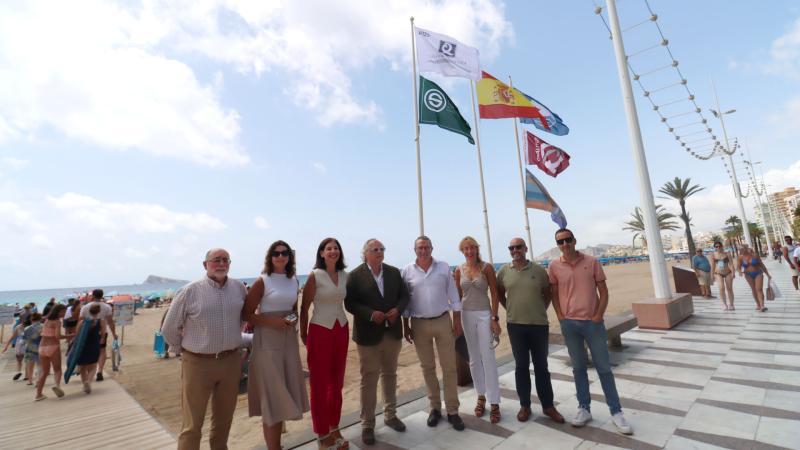

The ICTES flags 'Q' for Quality, 'S' for Sustainable Tourism, and 'Safe Tourism' are now flying on the beaches of Benidorm.
- The distinctions certify the quality of the beaches, water and services offered after passing an independent audit.
- Toni Pérez emphasises that "our beaches meet the demands of visitors and the criteria of the most demanding audits."
Benidorm's Levante, Poniente, and Mal Pas beaches now display the 'Q' for Quality, 'S' for Sustainable Tourism, and 'Safe Tourism' flags awarded by the Institute for Spanish Tourism Quality and Sustainability (ICTES). The nine distinctions were presented this afternoon at a ceremony held on Levante beach, attended by the mayor, Toni Pérez; the president of ICTES, Miguel Mirones; the Councilor for Beaches, Mónica Gómez; the director general of the Institute, Fernando Fraile; and several members of the local council.
The 'Q' for Tourism Quality flags have flown uninterruptedly on the beaches of Levante, Poniente, and Mal Pas since 2013, and the 'S' flag has flown uninterruptedly since 2022, when the Sustainable Tourism brand was created. Regarding tourist safety, the city has had the 'Safe Tourism' flag on all three beaches since 2020. Furthermore, the two Tourist Information Offices have also been certified with the Q for Quality since 2012 and the S for Sustainability since 2023. Likewise, Benidorm's hotels have 24 certifications (14 Q flags and 10 S flags), and in 2018, the city was the first DTI certified in the world.
During today's event, Mirones highlighted Benidorm City Council's "commitment and commitment" to quality, safety, and sustainable tourism and said that these certifications "demonstrate the rigor with which we work in the design and management of these services and guarantee the proper implementation of a management system, as well as compliance with standards." Mirones also noted that these distinctions represent "tourism promotion tools" that provide "prestige, differentiation, and reliability," which gives them a significant impact on consumer perception and represents recognition from public authorities.
Toni Pérez, for his part, highlighted the "rigorous" process verified by independent auditors "to pass an audit with very demanding criteria that certifies the quality of our beaches, the water, and the services offered." In this regard, he emphasized that "only the 'S' and 'Q' flags are the result of certification based on UNE and ISO standards," the only national and international organizations publicly recognised for developing standards for any sector of economic activity. They are, therefore, "a guarantee of the proper implementation of a management system" and represent "compliance with quality and sustainability standards, in addition to serving as an important tourism promotion tool." The mayor also expressed the city's "pride" in having these distinctions, "which certify that we have beaches that meet all the demands of our visitors and the most demanding audits," and which year after year "highlight that they are the greatest treasure we have in our city; a treasure to which we continually dedicate our greatest efforts to improving."
Requirements
For a beach or marina to display the Q flag for Tourist Quality, it must undergo a process that guarantees compliance with the international quality standard UNE-ISO 13009, agreed upon by almost one hundred countries, to ensure the highest quality in the provision of its services and the proper management of public facilities: cleaning and selective waste collection services, safety devices, rescue and first aid, tourist information services, access to bathing areas, restrooms, and leisure facilities, among others.
In the case of the S Flag for Sustainable Tourism, which will be awarded starting in 2022—the same year that Benidorm's beaches were first certified—it is the UNE 0083 standard, Contribution of tourism organisations to the Sustainable Development Goals (SDGs). The standard was developed by the GC-UNE 334 Sustainable Tourism Group, whose Secretariat is developed by ICTES. After passing an audit conducted by independent companies, it recognises the management of a beach that implements the SDGs of the UN 2030 Agenda, with regard to the sustainability (environmental, social, and economic) of its services.
ICTES is a business association representing all subsectors of Spanish tourism (through its associations, federations, and confederations). Its governing bodies also include the Ministry of Tourism, through the State Secretariat for Tourism, the Autonomous Communities, and the municipalities and provinces (through the FEMP). In 2025, ICTES, which became a reality in 2000, celebrates its 25th anniversary.
First for the latest UK & Spanish news on the hour every hour!

Latest Music Video's
Spain's More Music Variety











